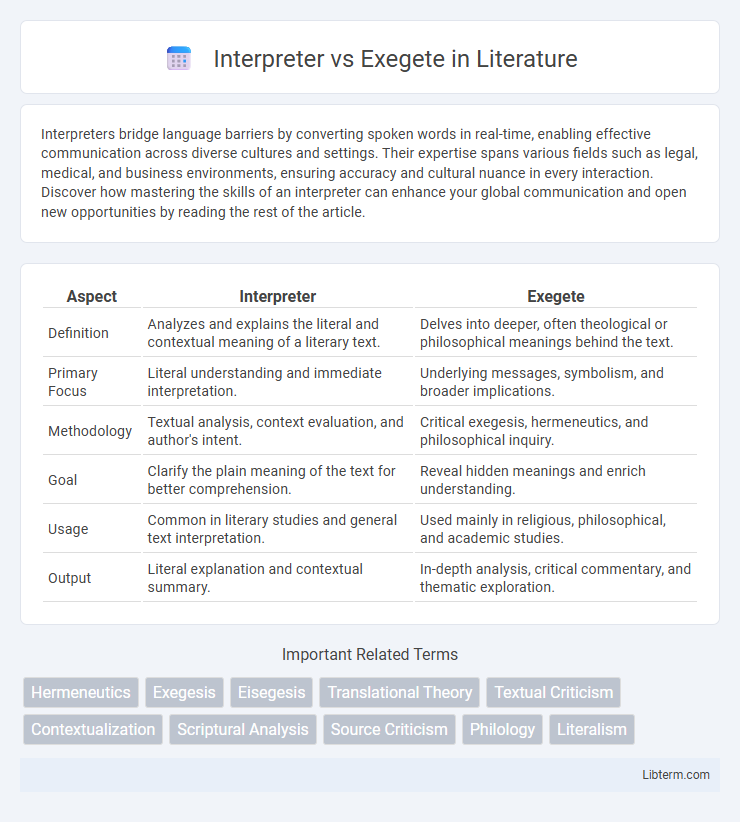Interpreters bridge language barriers by converting spoken words in real-time, enabling effective communication across diverse cultures and settings. Their expertise spans various fields such as legal, medical, and business environments, ensuring accuracy and cultural nuance in every interaction. Discover how mastering the skills of an interpreter can enhance your global communication and open new opportunities by reading the rest of the article.
Table of Comparison
| Aspect | Interpreter | Exegete |
|---|---|---|
| Definition | Analyzes and explains the literal and contextual meaning of a literary text. | Delves into deeper, often theological or philosophical meanings behind the text. |
| Primary Focus | Literal understanding and immediate interpretation. | Underlying messages, symbolism, and broader implications. |
| Methodology | Textual analysis, context evaluation, and author's intent. | Critical exegesis, hermeneutics, and philosophical inquiry. |
| Goal | Clarify the plain meaning of the text for better comprehension. | Reveal hidden meanings and enrich understanding. |
| Usage | Common in literary studies and general text interpretation. | Used mainly in religious, philosophical, and academic studies. |
| Output | Literal explanation and contextual summary. | In-depth analysis, critical commentary, and thematic exploration. |
Introduction to Interpretation and Exegesis
Interpretation involves explaining the meaning of a text by translating its language and context into understandable terms, while exegesis is a critical analysis aimed at uncovering the original intent and deeper significance of the text. Interpretation provides a broad understanding suitable for general comprehension, whereas exegesis employs historical, linguistic, and theological tools to derive precise meanings. Both practices are essential in biblical studies, with interpretation offering clarity and exegesis ensuring accuracy in understanding scripture.
Defining Interpreter and Exegete
An interpreter is a person who translates spoken or signed communication from one language to another in real-time, ensuring the message is conveyed accurately and comprehensibly. An exegete specializes in critically analyzing and explaining texts, especially religious scriptures, by examining context, language, and historical background to reveal deeper meanings. While interpreters focus on immediate verbal translation, exegetes engage in detailed textual interpretation and scholarly exegesis.
Historical Origins of Interpretation and Exegesis
Interpretation and exegesis both originate from ancient scholarly traditions aimed at understanding sacred texts, with interpretation rooted in general linguistic analysis and broader cultural contexts. Exegesis, historically tied to religious studies, specifically emerged to systematically extract intended meanings from biblical scriptures using historical-critical methods developed during the Hellenistic period. The distinction lies in exegesis' rigorous focus on original languages and contexts, establishing it as a scholarly discipline critical to theological studies since antiquity.
Core Responsibilities of an Interpreter
An interpreter's core responsibility is to accurately convey spoken or signed messages between speakers of different languages in real time, ensuring linguistic and cultural nuances are preserved. They facilitate communication in diverse settings such as conferences, legal proceedings, medical consultations, and diplomatic meetings, requiring quick thinking and advanced language proficiency. Unlike exegetes, who analyze and explain written texts, interpreters prioritize immediate understanding and clear interaction between parties.
Key Functions of an Exegete
An exegete critically analyzes and interprets texts, especially religious or classical writings, to uncover the original meaning and context. Key functions of an exegete include examining historical background, linguistic nuances, and cultural settings to provide accurate, informed insights. Unlike an interpreter who translates meaning in real-time, an exegete offers detailed, scholarly explanations grounded in thorough research.
Methodologies: Interpretation vs Exegesis
Interpretation involves analyzing texts by applying context, cultural background, and the interpreter's perspective to derive meaning, often allowing for broader, contemporary relevance. Exegesis employs a rigorous, systematic approach using historical-critical methods, language analysis, and theological frameworks to uncover the original intent of the text. While interpretation adapts meanings to modern contexts, exegesis seeks precise understanding based on the text's original setting and purpose.
Similarities Between Interpreters and Exegetes
Interpreters and exegetes both engage in the critical analysis of texts, aiming to uncover deeper meanings and contextual significance. They rely on linguistic expertise, historical knowledge, and cultural awareness to accurately convey the intended message of a passage. Both roles require a profound understanding of language nuances and the ability to bridge the gap between original content and contemporary comprehension.
Major Differences: Interpreter vs Exegete
The major differences between an interpreter and an exegete lie in their roles and approaches to understanding texts. An interpreter primarily focuses on translating or conveying the meaning of a text from one language or context to another, ensuring clarity and accessibility. In contrast, an exegete engages in deep analysis and critical examination of a text, often within religious or literary contexts, to uncover underlying meanings, historical significance, and nuanced interpretations.
Real-world Applications and Examples
Interpreters analyze the literal meaning of texts to clarify language and context, often used in legal settings where statutes require precise understanding for courtroom arguments. Exegetes provide deep, scholarly analysis of religious or historical documents, such as biblical exegesis, to uncover underlying theological or philosophical messages essential for academic research or sermon preparation. In practical terms, interpreters aid translators and diplomats by ensuring accurate communication, while exegetes support educators and scholars by offering critical insights into complex texts.
Conclusion: Choosing the Right Approach
Selecting between an interpreter and an exegete depends on the context and purpose of analysis; interpreters prioritize personal and contemporary understanding, while exegetes emphasize systematic, historical, and linguistic accuracy. The interpreter's approach suits dynamic application and relevance in modern scenarios, whereas the exegete's method excels in scholarly and theological precision. Choosing the right approach involves balancing subjective insight with objective, text-based rigor to best address the intended audience's needs.
Interpreter Infographic

 libterm.com
libterm.com